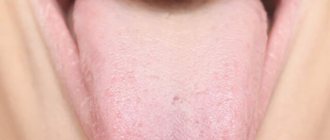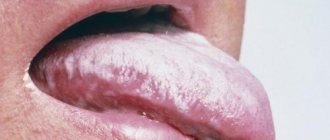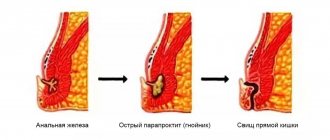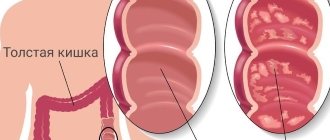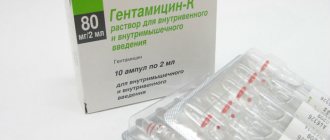Inflammation of the gastric mucosa caused by poor diet, negative effects of bacteria, and alcohol abuse is called gastritis. Types of gastritis are manifested by various symptoms, one of which is plaque on the tongue. This symptom may belong not only to gastritis, but also to other diseases of the gastrointestinal tract and other organs.
These can be liver pathologies, dehydration, side effects of medications, as well as intoxication and dyes from food products. In order to correctly diagnose the plaque that appears on the tongue during gastritis, you need to become familiar with the features of this symptom.
What does a healthy tongue look like?
The tongue is pale pink - absolutely healthy.
Diagnosis by the appearance of the tongue was mastered by ancient healers, who believed that a disease could not be considered cured until the patient’s tongue regained its previous appearance. The tongue of an absolutely healthy person has the following signs:
- Pale pink color;
- Small taste buds without pronounced features;
- No bad breath;
- Be moderately moist;
- The presence of a small amount of translucent bright pink coating is allowed;
- There is no unpleasant odor.
If you deviate from these signs, you should consult a general practitioner or gastroenterologist and undergo the examination prescribed by him.
How to get rid of bitterness in your mouth
If the bitterness and unpleasant taste are not caused by pathologies of the gastrointestinal tract and other diseases, then you can “fight” them yourself:
- Maintain good oral hygiene. You need to brush your gums and tongue, not just your teeth. Add a small amount of baking soda to your toothbrush before applying toothpaste. Brushing your teeth and tongue should take at least two and a half minutes. Remember to brush your teeth twice a day. Use dental floss and a tongue scraper and rinse your mouth regularly;
- eat more citrus fruits, drink orange and lemon juices. The acid stimulates the production of saliva and eliminates the bitter taste in the mouth;
- Visit your dentist regularly for preventive examinations and dental plaque removal;
- stop smoking;
- drink enough water;
- limit your consumption of fatty and spicy foods. Eat slowly, chewing your food thoroughly.
If you follow all these rules, and the bitterness in your mouth persists, consult a doctor, as the cause of unpleasant symptoms may be endocrine diseases, mental disorders, and pathologies of the gastrointestinal tract.
Related services: Consultation with a pediatrician Consultation with a family doctor
Signs of deviations from the normal state of the tongue
It is quite possible that, once you look at your tongue, you will see a rather unsightly picture. Symptoms of deviation from the norm:
- A coating of various colors, thicknesses, and with different locations of spots appears on the back of the tongue;
- The sides of the tongue are bright red;
- The taste buds look uneven, some of them increase in size and begin to disturb with unpleasant sensations, taste sensations change, their intensity weakens;
- The oral cavity becomes unusually dry;
- In some cases, the appearance of pain and burning is diagnosed;
- There is an unpleasant odor from the mouth;
- After cleaning the tongue, the plaque appears again after a short time.
In the plaque that appears on the tongue, laboratory testing can reveal leukocytes, pathogenic microflora, and exfoliated epithelial cells.
This video will tell you about plaque on the tongue due to gastritis:
Chronic gastritis
What is the tongue like with chronic gastritis? A white coating of dense consistency is the main sign of protracted inflammation of the gastric mucosa. Clearing the tongue of such plaque becomes problematic. In most cases, this symptom indicates the presence of serious disorders in the functioning of the digestive tract. During an exacerbation, the patient is most often bothered by symptoms such as flatulence, abdominal pain, upset stool, and belching.
In the chronic course of the pathology, insufficiency of secretory function is usually observed. Due to a lack of gastric juice and changes in acidity, a characteristic whitish coating often appears on the tongue. Moreover, in some cases it does not completely cover the surface of the organ, but only in spots.
The tongue with gastritis with high acidity may have a white coating with orange impurities. This is observed when gastric juice refluxes into the oral cavity during belching. The plaque covers the tongue with a thick layer and has an unpleasant odor.
Diagnosis of diseases of the gastrointestinal tract by language
The tongue will tell you about gastrointestinal diseases.
Modern gastroenterology does not specialize in diagnosis based on the appearance of the tongue. However, an attentive person suffering from such pathologies can distinguish the symptoms of gastrointestinal diseases:
- Acute gastritis - a viscous, dense coating of white-gray color is visible on the entire surface of the tongue, with the exception of the tip and side parts. The mouth feels dry and has an unpleasant acidic taste. Perhaps, instead of dryness, increased salivation will appear. In acute gastritis, similar symptoms include heartburn and sour belching, cutting pain in the epigastric region 1-2 hours after eating, weakness, headaches, diarrhea, heaviness in the stomach. With inadequate treatment, acute gastritis becomes chronic.
- Chronic gastritis - light deposits on the tongue are replaced by occasional dark gray deposits. To the previous symptoms are added such characteristic signs of chronic gastritis as astheno-neurotic syndrome, constant irritation, aching pain that intensifies some time after eating. About 40% of all cases of acute gastritis become chronic. This condition is fraught with the spread of the process to the duodenum and the development of gastroduodenitis.
- A stomach ulcer in combination with gastritis affects the condition and appearance of the tongue - its surface becomes bright red, with gray spots of dense plaque that are difficult to clean. This picture is complemented by signs of stomatitis and cyanosis. The patient feels a burning sensation and the production of saliva increases.
- Oncological damage to the gastrointestinal tract, as well as the presence of internal circulation, is reflected in the condition of the tongue by the appearance of evenly spaced white plaque of increased viscosity, excessive saliva production, and a burning sensation in the oral cavity.
Other causes of bitterness in the mouth
Why there is a constant bitter taste in the mouth - possible reasons:
- smoking;
- inhalation of vapors of certain chemicals;
- dehydration;
- glossitis;
- dry mouth;
- allergy;
- salivary gland infections;
- lack of zinc and vitamin B12;
- nasal polyps;
- autoimmune diseases such as Sjögren's syndrome and Bell's palsy;
- mouth breathing;
- inflammatory diseases of the upper respiratory tract;
- injuries to the head, mouth, nose;
- braces;
- Radiation therapy to the neck or head.
Bitterness in the mouth in the early stages of pregnancy may be associated with changes in hormonal levels, attacks of nausea and vomiting (toxicosis). Read more about this symptom on our website.
Differentiation of plaque in gastritis from other diseases of the gastrointestinal tract
A thick, grayish coating is characteristic of dysentery.
It is important to suspect the onset of a dangerous disease in time. To take action and prevent complications from occurring. Differential diagnosis by tongue of gastritis from other diseases and conditions:
- A thick, grayish coating is characteristic of dysentery. In this case, the tongue looks cracked, and less saliva is produced than usual.
- Desquamative glossitis - this type of inflammation of the tongue is characterized by such symptoms as red spots of complete absence of epithelium or several altered taste buds on the tongue, covered with a white coating.
- Galvanic stomatitis is a form of inflammation of the tongue that arises as a result of a reaction to metal prostheses, manifested by spots in the form of pimples, and subsequently by the appearance of erosions against a background of white plaque.
- Infectious diseases - sore throat, scarlet fever, diphtheria, HIV infection can cause the appearance of a white coating on the tongue, but almost all of these infections are accompanied by high fever and skin rashes.
- Diseases of the heart and blood vessels - plaque is located on the anterior third of the tongue.
- Kidney disease - plaque on the tongue is localized at the back along the edges.
- Endocrine disorders - under the plaques of white plaque there are ulcers and erosions.
- Anemia is not a coating on the tongue, but blanching of the entire surface of the organ. Diseases of the respiratory system are often indicated by the localization of white plaque on the front and along the edges of the tongue.
- Diseases of the salivary glands - the appearance of a white coating is accompanied by the appearance of an unpleasant odor.
- Diseases of the liver and gall bladder - the color of the plaque is not white, but has a yellowish or brown tint. A white coating on the tongue can be caused by the consumption of dairy products, as well as the proliferation of bacteria and fungi in those who abuse sweets. Unlike plaque during gastritis, such layers are easily removed and do not form further.
Does the form of the disease affect it?
With gastritis, the tongue is almost always coated. Based on its nature, the doctor can determine the form of stomach pathology. If the plaque has a viscous consistency and a gray tint, it means that an acute form of pathology is developing. In this case, a large area of the organ is covered with plaque. Only the sides and the tip of the tongue can remain clean. In addition, severe dryness appears in the mouth or, conversely, increased secretion of the salivary glands is observed. A constant sour taste, regardless of food intake, is another symptom of acute gastritis.
The hyperacid type of gastritis is characterized by swelling of the tongue. A patient suffering from this phenomenon feels discomfort and lack of space in the oral cavity. Teeth imprints appear on the lateral surfaces of the organ, the tissue structure becomes loose, and hypertrophied papillae increase.
Is plaque on the tongue dangerous - how to treat it
An ultrasound of the stomach will help clarify the diagnosis.
Plaque itself does not pose any threat to health. As soon as the underlying disease is cured, the condition of the tongue will return to normal.
As for gastritis, long-term treatment with careful adherence to the recommendations of a gastroenterologist will help relieve its symptoms.
Perhaps the doctor will conduct research aimed at clarifying the diagnosis: FGDS, ultrasound of the stomach, laboratory tests of blood and gastric juice. The following drugs will be prescribed as treatment:
- Antibiotics of 2-4 types, taken in combination:
- Pro- and prebiotics;
- Vitamins;
- Antacids;
- Proton pump blockers.
Patients with gastritis must follow a strict diet aimed at sparing the gastric mucosa and not provoking the release of excessive amounts of hydrochloric acid. With this treatment, not only the gastric mucosa, but also the condition of the tongue will definitely return to normal.


